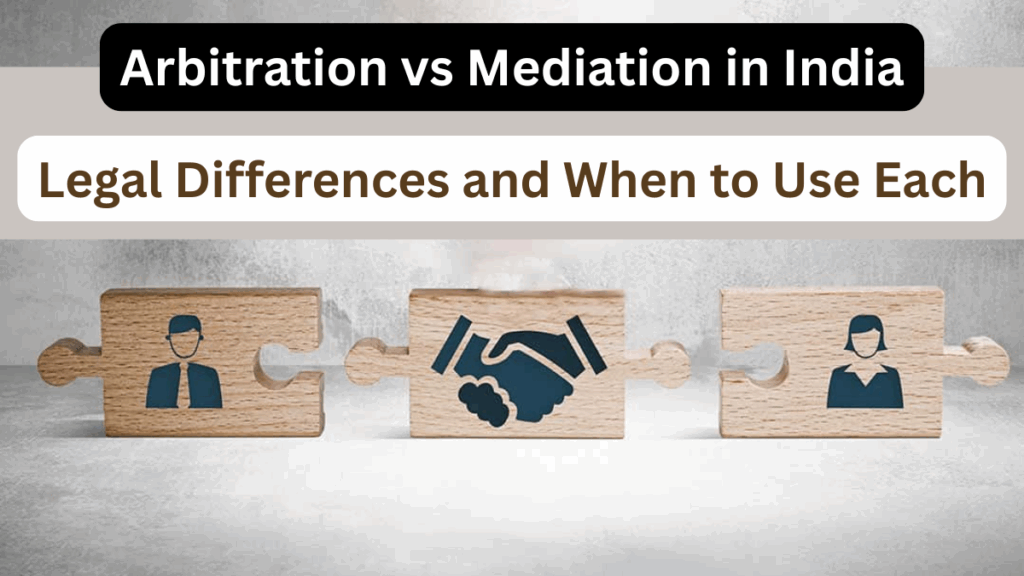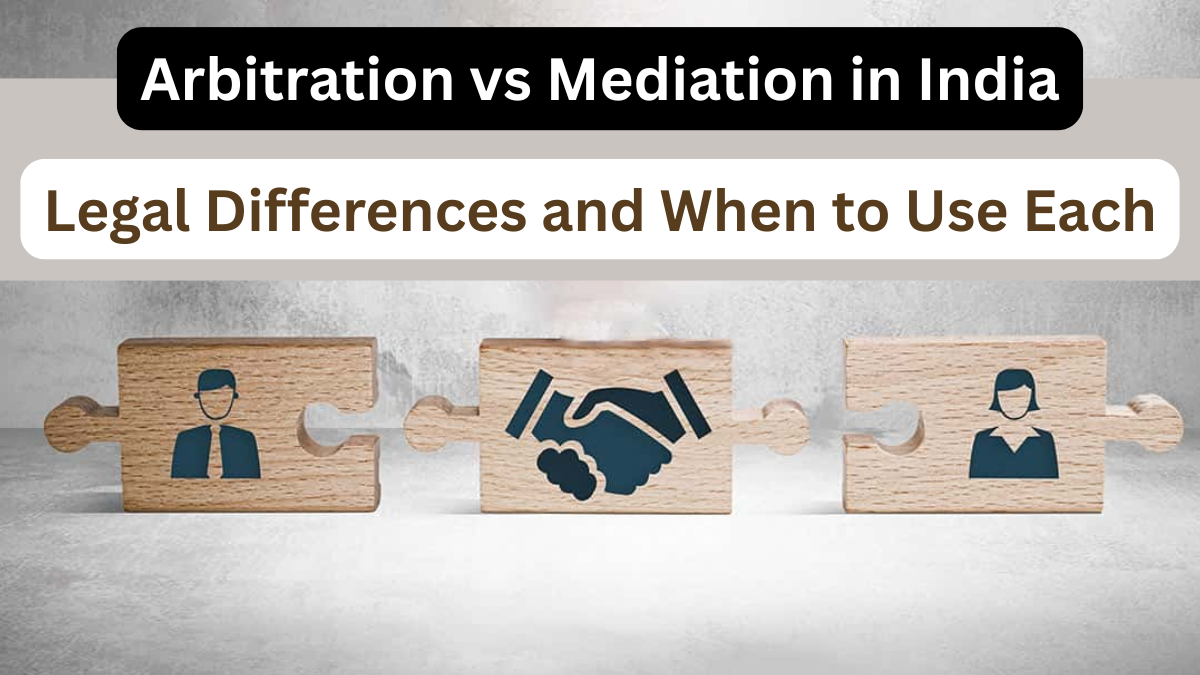When a legal dispute arises, especially in civil or commercial matters, most people immediately think of going to court. But in India, two increasingly popular alternatives offer speed, privacy, and reduced costs—Arbitration and Mediation.
While both methods fall under Alternative Dispute Resolution (ADR), they operate very differently. So, how do you decide which one is right for your situation?
Let’s break it down.

What Is Arbitration?
Arbitration is a formal, legally binding process where a neutral third party, the arbitrator, hears both sides and makes a decision. It’s governed by the Arbitration and Conciliation Act, 1996 in India.
Key Features of Arbitration
-
Legally binding decision by arbitrator(s)
-
More structured and formal
-
Often used in commercial and contractual disputes
-
Proceedings are private but resemble court trials
What Is Mediation?
Mediation, on the other hand, is a non-binding and informal process where a neutral third party, the mediator, helps both parties arrive at a mutually agreeable solution.
Key Features of Mediation
-
Voluntary and non-binding (unless parties formalize it)
-
Encourages collaboration and compromise
-
Cost-effective and quick
-
Often used in family, property, or business disputes
Arbitration vs Mediation: A Quick Comparison
Here’s a table to understand the legal differences in India between these two:
| Feature | Arbitration | Mediation |
|---|---|---|
| Nature of Process | Adjudicative (decision is imposed) | Facilitative (parties create own outcome) |
| Legal Binding | Yes | No (unless agreement is made binding) |
| Governing Law | Arbitration and Conciliation Act, 1996 | Varies, under Mediation Act, 2023 |
| Confidentiality | High | Very high |
| Control over Outcome | Arbitrator decides | Parties decide |
| Common Use Cases | Commercial contracts, construction | Matrimonial, partnerships, workplace |
| Time & Cost | Moderate to high | Low |
Legal Differences in India: Mediation vs Arbitration
Understanding the legal differences in India between these processes can help in choosing the right method.
Formality
Arbitration is more formal and structured, resembling court procedures. Mediation is conversational and informal.
Outcome Enforcement
Arbitration awards are legally binding and enforceable like a court judgment. Mediation agreements need to be registered or transformed into a consent decree to be enforceable.
Usage in Contracts
Arbitration clauses are frequently included in business contracts. Mediation is more often court-referred or voluntarily initiated.
When Should You Use Arbitration?
Choose arbitration when:
-
A legally enforceable decision is necessary
-
The dispute involves high-value contracts or international parties
-
Time-bound resolution is required
When Should You Use Mediation?
Opt for mediation when:
-
You want to preserve relationships (like in family or business disputes)
-
A quick, low-cost settlement is the priority
-
You are open to negotiation and compromise
FAQs
1. Is arbitration better than mediation in India?
Not necessarily. It depends on the nature of the dispute. Arbitration is ideal for complex legal matters needing a binding resolution, while mediation works well for emotional or interpersonal disputes.
2. Can I go to court after mediation or arbitration fails?
Yes. If mediation fails, parties can go to court or choose arbitration. If arbitration fails, limited judicial review is available but it’s harder to appeal.
3. Are both arbitration and mediation recognized by Indian courts?
Yes. Indian courts actively promote both methods, especially under the Commercial Courts Act and Mediation Act, 2023, to reduce litigation burden.
4. Can I include both clauses in a business contract?
Absolutely. Many contracts include a mediation first, arbitration later clause, offering a tiered dispute resolution approach.
Final Thoughts
When it comes to Arbitration vs Mediation in India, there is no one-size-fits-all solution. Each method serves different needs based on the dispute’s complexity, the desired outcome, and the relationship between the parties.
Understanding the legal differences in India can help individuals, businesses, and legal professionals choose the most effective and efficient dispute resolution path.
Click here to learn more
